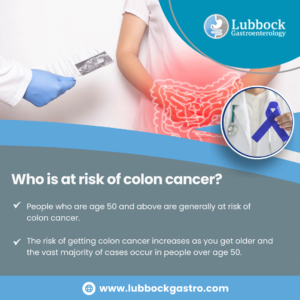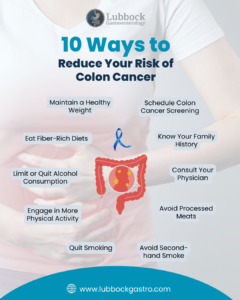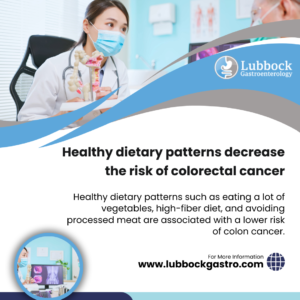Who is at risk of colon cancer?

Who is at risk of colon cancer
People who are age 50 and above are generally at risk of colon cancer. The risk of getting colon cancer increases as you get older and the vast majority of cases occur in people over age 50.
However, the incidence of colorectal cancer in younger adults has risen steadily in recent times, but it’s still not a common disease in young people.
Certain lifestyle factors can increase your risk of developing colon cancer. These include engaging in a sedentary lifestyle, being overweight or obese, heavy alcohol use, and smoking.
Certain racial and ethnic backgrounds can also affect the risk of colorectal cancer. African Americans and Jewish people of Eastern Europe are at higher risk of developing colon cancer.
Individuals with a family history of colon cancer or rectal cancer are at higher risk of developing colon cancer. If a member of your family, especially an immediate member like a parent, sibling, or child has had colon cancer, you are at a higher risk of developing colon cancer.
Those with a personal or family history of polyps are also at risk of colon cancer. Colorectal polyps are noncancerous growths that can occur anywhere from the colon to the rectum.
Polyps are not cancerous but should be removed because they might later become cancerous. Individuals who have had multiple colon or rectal polyps are at a higher risk for colon cancer.
10 Ways to Reduce Your Risk of Colon Cancer

10 Ways to Reduce Your Risk of Colon Cancer
Maintain a Healthy Weight
Obesity is linked to a higher risk of developing several types of cancer, including colorectal cancer. The ideal weight for every individual varies. You can use your body mass index (BMI) to determine if you’re overweight and adopt strategies to lose any excess weight.
BMI is a measurement of a person’s height-to-weight ratio. If your BMI is higher than 25, you may be overweight. If your BMI is greater than 30, it is a sign of obesity. If you know you’re overweight, you should talk to your doctor to make a plan for losing weight.
Once you’re at a healthy weight, be intentional about maintaining a stable weight by eating a well-balanced diet and exercising frequently.
Eat Fiber-Rich Diets
One of the numerous health benefits of fiber-rich diets is keeping bowel movements regular and promoting good gut health. A few research have also shown that adequate fiber intake is associated with reduced colorectal cancer risk.
Even with these health benefits, a significant percentage of the population still doesn’t have enough fiber in their daily diet. To help reduce your colorectal cancer risk and a load of other chronic health conditions, experts recommend getting enough fiber in your diet daily.
Limit or Quit Alcohol Consumption
Drinking alcohol is associated with numerous health risks both short-term and long-term. The risk of developing colorectal cancer and a lot of other types of cancer are associated with moderate to heavy alcohol use. If you don’t want to quit alcohol, you can stick to no more than one serving of alcohol per day.
The NIH’s definition of one serving includes 12 ounces of 5% Alcohol by volume (ABV) beer, 5 ounces of 12% ABV wine, and 1.5 ounces of 80-proof liquor.
Check for these numbers before consuming any alcohol since some drinks have higher percentages than those listed here.
Engage in More Physical Activity
A sedentary lifestyle is a risk factor for developing colon cancer and research shows that exercise helps lower a person’s risk of developing several types of cancer. The health benefits of regular exercise and physical activity can’t be overestimated.
Regular exercise has been shown to help boost energy levels and enhance your mood as well as reduce the risk of chronic disease. Try to exercise at least 30 minutes per day, five days per week is good for starters.
Also, ensure your combination of exercises totals 150 minutes in a week. Every physical activity counts. Don’t focus only on cardio and strength training. Try picking up things to do around your home, including house chores and yard work.
Quit Smoking
Smoking is also a risk factor for chronic health conditions as well as cancers. While most people know that cigarette smoking increases the risk of developing lung cancer, not a large population knows about its connection to colon cancer and rectal cancer.
Smoking can increase your risk of colon cancer. Hence, you should quit smoking to avoid developing colon cancer.
Avoid Second-hand Smoke
You don’t need to actually smoke cigarette yourself before you inhale cigarette smoke. You can passively smoke cigarettes by breathing in smoke breathed out by people who smoke around you or from burning tobacco products.
Second-hand smoking is just as bad as actively smoking cigarettes and can cause lung cancer in adults who have never smoked. It can also increase the risk of colon cancer. You should avoid areas where people are smoking cigarettes or burning tobacco products.
Avoid Processed Meats
Studies have shown that eating a lot of processed meat increases a person’s risk of developing colorectal cancer which explains why professed meat is designated as “carcinogenic”.
A term used for substances that have the potential to cause cancer. Processed meats include lunch meat, bacon, and sausage, as well as organic or nitrate-free lunch meat. Staying away from all forms of processed meat can help keep you safe from developing colon cancer.
Consult Your Physician
Certain health conditions like ulcerative colitis, Crohn’s disease, or type 2 diabetes, are associated with an increased risk of developing colorectal cancer.
Consult your doctor for expert advice and recommendations on how to lower your risk of developing colon cancer.
Know Your Family History
Having a family history of colorectal cancer increases your risk of colon cancer. If there’s anyone, especially your parents, siblings, or children that has colon cancer, you should go for colonoscopy screening or consult your doctor.
Schedule Colon Cancer Screening
The aim of colon cancer screening is to identify colorectal cancer in individuals who don’t have typical symptoms like bloody stool or abdominal pain. With colon cancer screening, specialists may be able to detect colorectal cancer at its early stages and can as well identify precancerous colorectal polyps.
There are two kinds of screening tests for colon cancer, which are stool-based test and visual exams. The standard colon cancer screening test is a colonoscopy.
Inside the colon is checked for polyps, whether non-cancerous or cancerous. If non-cancerous polyps are found, they are removed before they become cancerous. Colonoscopy screening offers the advantage of detecting colon cancer at its earliest stage.
Primary Prevention of Colorectal Cancer
It’s true that cancers aren’t 100% preventable but there are certain things you could do to lower your chance of developing colorectal cancer. Healthy behaviors can go a long way toward improving your health and lowering your risk of many cancers including colorectal cancer.
A lot of studies suggest that people may reduce their risk of developing colorectal cancer by increasing physical activity, maintaining a healthy weight, and having a healthy dietary pattern.
What are my colorectal cancer screening options?
Your colorectal cancer screening options range from visual exams to stool tests. The visual exam includes different forms of colonoscopy. Generally during a colonoscopy exam, a long, flexible tube is inserted into the rectum.
A tiny video camera at the tip of the tube allows the doctor to detect any changes in your colon. There are three types of stool tests approved by the US Food and Drug Administration (FDA) to screen for colorectal cancer.
There’s the fecal immunochemical test, guaiac FOBT, and multitarget stool DNA testing (FIT-DNA).
Foods That Fight Colorectal Cancer
There are foods that can help reduce your risk of developing colon cancer. Such food includes plant-based foods like vegetables, whole grains, legumes (beans) and nuts.
Consume lean protein in moderation, like fish and poultry, and choose low-fat dairy products as much as possible. Drinking plenty of water also helps.
Healthy dietary patterns decrease the risk of colorectal cancer

Healthy dietary patterns decrease the risk of colorectal cancer
Dietary intake is one of the important factors contributing to colorectal cancer development. Populations consuming high intakes of red meat, sugar, and white bread may be at increased risk of the disease.
Healthy dietary patterns such as eating a lot of vegetables, high-fiber diet, and avoiding processed meat are associated with a lower risk of colon cancer.
How to reverse colon cancer
Colon cancer is not reversible for most patients with metastatic colorectal cancer. However, patients with a localized tumor or those who have limited involvement of distant organs can be cured with surgery.
Can Colorectal Cancer Be Prevented?
It can’t be totally preventable, but you can lower your chances of developing one. We have discussed extensively the various ways that you can lower your chances of developing colorectal cancer.
Getting regular screening tests for colon cancer is the best way to prevent you from developing colorectal cancer.
Colorectal Cancer Screening and Treatment at Lubbock Gastroenterology in Lubbock, TX
Colorectal cancer is one of the most preventable cancers due to the availability of routine colorectal cancer screening test centers in Lubbock, TX.
The best place to get colorectal cancer screening and treatment in Lubbock is Lubbock Gastroenterology, an advanced and highly reputable medical center that provides diagnostic and therapeutic procedures for patients with various gastrointestinal conditions.
Get your colorectal screening done at Lubbock Gastroenterology by scheduling an appointment with Dr. Sameer Islam, a trained and experienced Gastroenterologist in Lubbock, TX.
